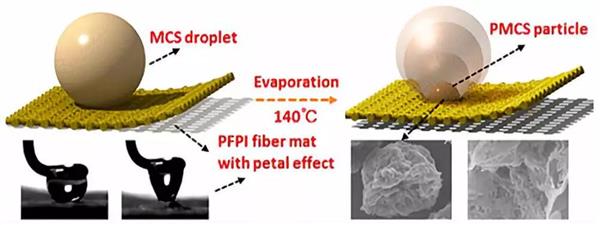[ACS Sustainable Chem. Eng.]Efficient and Green Fabrication of Porous Magnetic Chitosan Particles Based on a High-Adhesive Superhydrophobic Polyimide Fiber Mat
作者:Lidong Tian, Xiaowei He, Xingfeng Lei, Mingtao Qiao, Junwei Gu* and Qiuyu Zhang*
关键字:Cu(II) adsorption; High adhesion; Magnetic chitosan; Porous PI fibers
论文来源:期刊
发表时间:2018年
In this paper, an efficient and green strategy was developed to synthesize porous magnetic chitosan (PMCS) particles via a special superhydrophobic effect of a porous fluorinated polyimide (PFPI) fiber mat with a petal effect. By controlling the fiber morphology and porous structures on the fiber surface, the water contact angle on the fiber mat reached as high as 155.3° and the adhesion to a water droplet was up to 236.4 μN, indicating that the PMCS droplets could be pinned on the fiber surface steadily. Then PMCS particles can be obtained after evaporation, exfoliation, lavation, and desiccation processes. Morphologies and porous structures of PMCS particles were investigated. Cu(II) adsorption ability of PMCS particles have been characterized, and the effects of different experimental conditions like adsorbent dosage, pH, initial Cu(II) concentration, and contact time on the adsorption capacity were also examined. Field emission scanning electron microscopy (FE-SEMs) showed that PMCS particles presented a stable morphology and adjustable porous structures. The adsorption isotherm was better fitted with the Langmuir isotherm model, and the adsorption kinetics followed the pseudo-second-order kinetic model. The maximum adsorption capacity of PMCS particles was 188.68 mg/g. Even after eight cycles, 85% adsorption capacity was still retained. These results suggested that the obtained PMCS particles exhibited excellent Cu(II) adsorption capacity and reusability. Moreover, compared with traditional methods, the mentioned fabrication approach of PMCS particles was more effective, saves energy, and was environmentally friendly.
